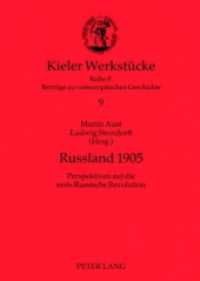- ホーム
- > 洋書
- > 英文書
- > Philosophy
Full Description
The received view of identity takes it to be a binary relation between objects like many others: specifically, identity is thought to be the binary relation every object bears to itself and to no others. As such, it is supposed to play a fundamental role in our conceptual scheme. It is also widely held that Gottlob Frege (1848-1925), after a false start in his Begriffsschrift of 1879, where he proposed that identity is a relation between signs, eventually came round to the now mainstream view, the first paragraph of his celebrated 1892 essay "On Sense and Reference" marking the transition. In Frege: Identity Challenges Reflection, Ulrich Pardey and Kai F. Wehmeier show that common wisdom is mistaken on both counts. First, careful exegesis shows that Frege did not repudiate the earlier, sign-based conception of identity in his 1892 essay, but instead defended it; moreover, that conception is in no way refuted by the collection of formal and philosophical objections that have been raised against it in subsequent decades. In particular, the Begriffsschrift theory of identity, far from being incompatible with quantification over objects, in fact affords an elegant, ontologically conservative integration of identity into predicate logic. Second, Pardey and Wehmeier argue that our conceptual scheme is not at all committed to a binary relation that every object bears to itself and only itself. Moreover, the tension between the alleged binarity of the identity relation and the logical impossibility of its ever relating two things, famously pointed out by Wittgenstein in the Tractatus, forms the basis of an argument for the logical incoherence of such a relation.
Contents
Foreword
Abbreviations of Works by Frege
General Introduction
Part I Frege>'s Conception of Identity
0: Preliminary Remarks
1: Identity in CS and in SR
2: Bifurcation in Meaning
3: Arithmetic Equality and Equality of Content
4: Frege>'s Adoption of Leibniz>'s Conception
5: The Structure of the First Paragraph of SR
6: Cognitive Value
7: The Trivial Conception of Self-Identity
8: The Arbitrary Connection
9: A Transition Step
10: The Connection via Mode of Presentation
11: Objections from Translation
12: Conclusion of Part I
13: Appendix: Frege>'s Texts
Part II Against Objectual Identity
0: Roadmap
1: Notions of Identity
2: Identity and Quantification
3: Identity and Wittgensteinian Quantifiers
4: The CS Theory of Identity
5: Identity and Arity
General Conclusion
Bibliography
Index







